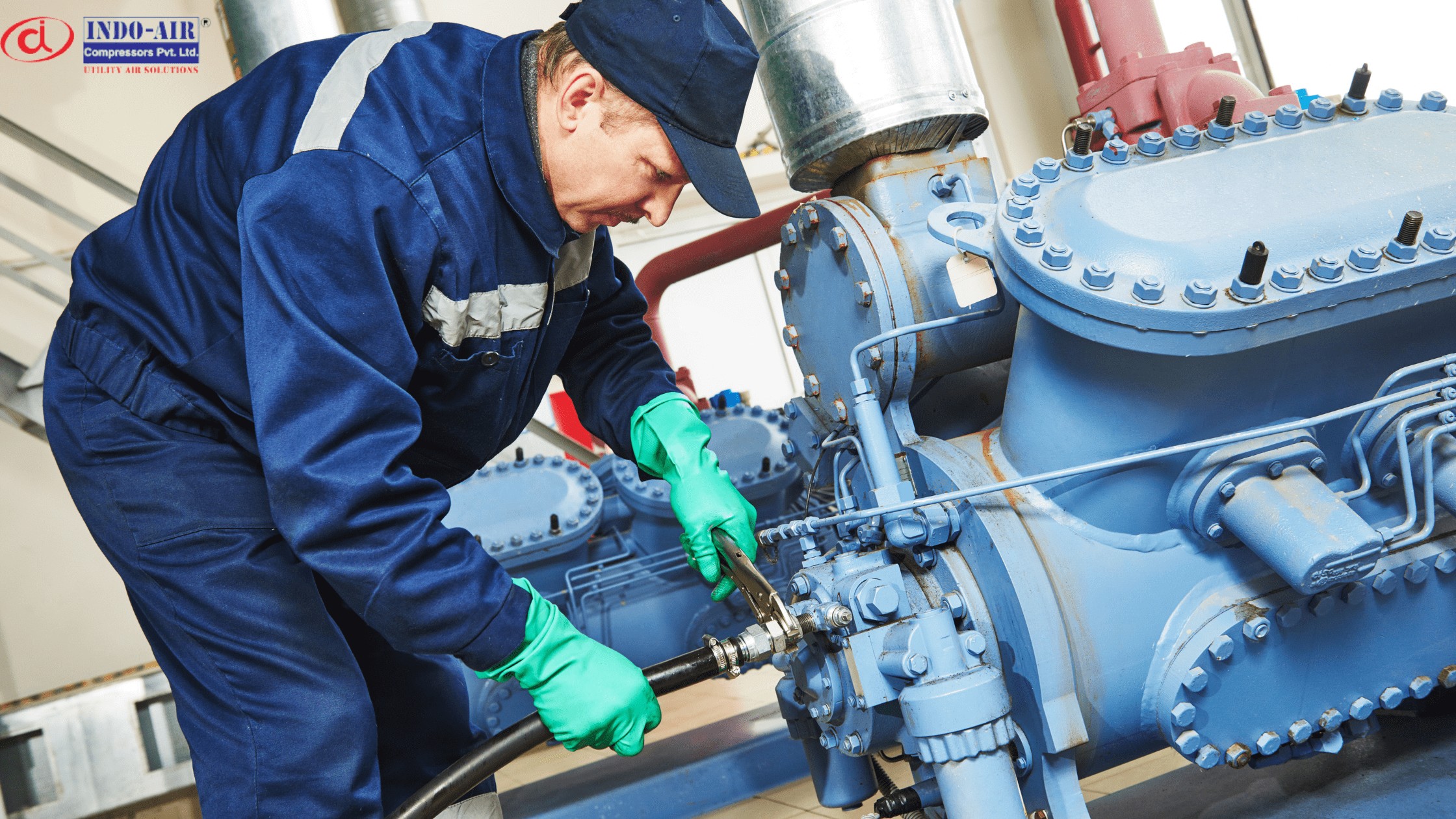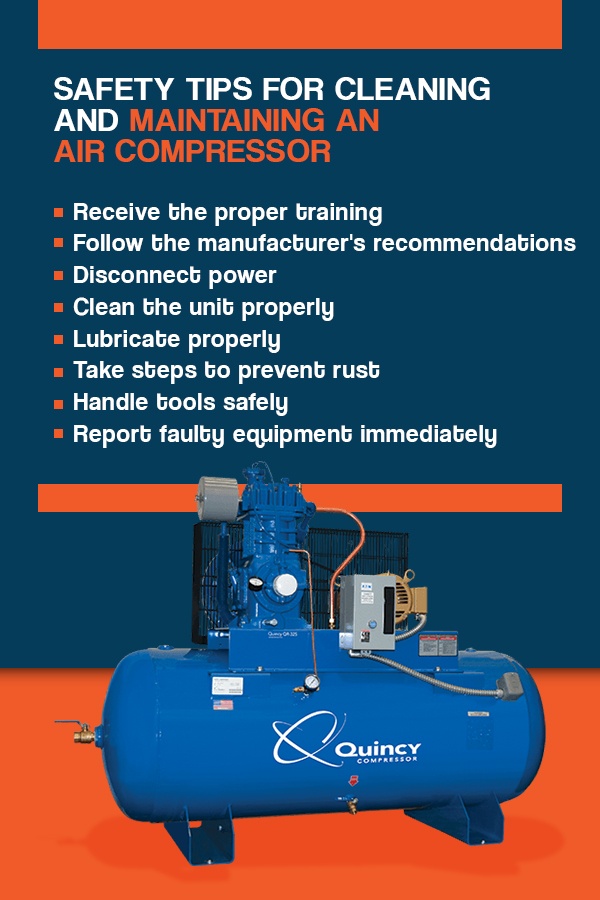Imagine the smooth hum of your air compressor, working effortlessly as you tackle your projects with ease. But what happens when that hum turns into a sputter or, worse, silence?
The key to preventing such frustrating scenarios is regular maintenance. By taking the right steps, you can ensure that your air compressor remains a reliable partner in your work, saving you time, money, and stress. You’ll discover simple yet effective tips to keep your air compressor in top shape.
Whether you’re a seasoned pro or just getting started, you’ll find practical advice tailored to your needs. Dive in, and let’s make sure your air compressor runs like a well-oiled machine!

Credit: indoair.com
Types Of Air Compressors
Air compressors come in different types. Rotary screw compressors use two screws to compress air. They are quiet and strong. Piston compressors use a piston and cylinder. They are good for small jobs. Scroll compressors have two scrolls. One scroll moves and one stays still. They are quiet and need less maintenance. Centrifugal compressors use a spinning disk. They are great for big jobs. Each type is useful in different situations. Choose the right one for your needs.
Daily Maintenance Checks
Oil levels need to be just right. Too low, and parts get hot. Too much, and they might leak. Check the oil sight glass. Make sure the level is in the middle. Use a clean cloth to wipe spills. Always use the correct type of oil.
Leaks waste air. Listen for hissing sounds. Feel for air escaping. Look at joints and connections. Tighten any loose parts. Use soapy water to find leaks. Bubbles will show where leaks are.
Compressors should not get too hot. Feel the machine with your hand. If it feels too hot, something is wrong. Make sure vents are clear. Air needs to flow freely. A fan can help cool it down.
Weekly Maintenance Routine
Air filters catch dust and dirt. They keep the air clean. Dirty filters make the compressor work harder. This uses more energy. Clean or replace them weekly. It helps the compressor run smoothly. Always turn off the machine first. Safety is important.
Belts help the compressor parts move. Loose or cracked belts can break easily. Check them each week. Tighten loose belts. Replace broken belts quickly. This prevents bigger problems later. Use a wrench to adjust the belts. Keep them snug but not too tight.
Safety systems keep the compressor safe. Test them weekly. Check the pressure relief valve. It should open and close well. This stops too much pressure. Look at gauges and lights. They should show correct readings. Fix anything broken. Safety comes first.
Monthly Maintenance Tasks
Air compressor maintenance ensures long-lasting performance. Check oil levels, clean filters, and inspect hoses monthly. Tighten any loose bolts and listen for unusual noises. Regular upkeep prevents costly repairs and boosts efficiency. Remember, safety first when handling equipment.
Drain Condensate
Air compressors collect waterinside. This can cause rust. Drain the condensate to keep the compressor safe. Use a valveto let the water out. This keeps the inside dry. Regular draining stops damage. It also helps the machine run better.
Check Electrical Connections
Wirescan become loose over time. Check all connections each month. Tighten them if needed. Safe connections keep the compressor running smoothly. Loose wires can cause problems. They may even stop the machine. Check often to avoid trouble.
Inspect Valves
Valvescontrol air flow. Check them for dirt and damage. Clean them if dirty. Replace them if broken. Good valves help the compressor work well. Bad valves can stop air flow. This makes the machine less efficient. Regular checks keep it in top shape.
Annual Maintenance Procedures
Lubricants keep the air compressor parts moving smoothly. Old lubricants can cause wear. Changing lubricants once a year is vital. Use the right type. Follow the manual’s advice. New oil should be clean and clear. This helps the compressor work better.
Pressure switches control the compressor’s operation. If they fail, the compressor might not run. Check them for any damage. Make sure they are set correctly. Safe operation depends on this. Adjust if needed. It keeps the compressor safe.
The cooling system prevents overheating. Clean the fins and vents. Dust and dirt can block them. This can cause heat problems. Ensure the fan works well. Replace any broken parts. This will help the compressor last longer.

Credit: www.instructables.com
Troubleshooting Common Issues
Low pressure can make the compressor work poorly. Air leaks are a common cause. Check all hoses and connections for any leaks. Dirty filters can block air flow. Clean or replace filters regularly. Sometimes the valves might not work well. Inspect them for any damage or blockage.
Strange noises often mean something is wrong. Loose parts might rattle and make noise. Tighten bolts and screws to fix this. Worn-out bearings can make grinding sounds. Replace bearings if needed. If the motor makes noise, it might need attention. Check for any damage or wear.
Overheating can damage the compressor. Blocked vents stop air flow and cause heat. Clean vents to ensure proper cooling. Low oil levels can lead to overheating. Check oil levels often and refill when necessary. Excessive use might cause the unit to overheat. Give the compressor breaks during long use.
Safety Precautions
Wear protective gearto stay safe. Gloves protect hands. Goggles keep eyes safe. Helmets prevent head injury. Safety boots keep feet safe from falling objects.
Ensure proper ventilationin the room. Fresh air helps. Open windows if possible. Fans help air move. Avoid closed spaces. Keep air flowing.
Follow manufacturer guidelinescarefully. Read the manual. It has important instructions. Check every detail. Follow steps given. Do not skip any part. Safety is key.

Credit: www.quincycompressor.com
Tools And Equipment Needed
Keeping an air compressor in good shape requires the right tools. A wrench set is necessary for tightening and loosening bolts. Oil is important to keep the compressor running smoothly. You will need a screwdriver for various adjustments. A cleaning brush helps remove dirt and dust. Filters must be changed regularly to keep the air clean. A pressure gauge is needed to check air levels.
Safety goggles protect your eyes from dust and debris. Gloves keep your hands safe from sharp parts. Ear protection is important to guard against loud noises. A mask helps you breathe safely around dust. Steel-toe boots protect your feet from heavy objects. Always wear a safety vest in busy areas.
Frequently Asked Questions
What Maintenance Is Required On An Air Compressor?
Regularly check and replace air filters. Drain moisture from tanks daily. Inspect hoses and connections for leaks. Lubricate moving parts as needed. Monitor and maintain proper oil levels. Clean intake vents to prevent dust buildup. Ensure the safety valve functions correctly.
Schedule professional inspections annually for optimal performance.
Do I Need To Put Oil In My Air Compressor?
Check if your air compressor is oil-free or oil-lubricated. Oil-free compressors don’t need oil. Oil-lubricated compressors require regular oil maintenance for efficient operation. Always refer to the manufacturer’s guidelines for specific instructions on oil usage. Proper maintenance ensures longevity and optimal performance of your air compressor.
What Is The Best Lubricant For Air Compressors?
Synthetic oil is the best lubricant for air compressors. It offers excellent viscosity, reduces wear, and enhances performance. Regularly check compatibility with your compressor model to ensure optimal functioning. Synthetic oils also improve efficiency and longevity, keeping your air compressor running smoothly for longer periods.
Should You Empty An Air Compressor After Every Use?
Yes, empty your air compressor after each use to prevent moisture buildup. This helps avoid rust and damage. Regular draining ensures optimal performance and longevity. Prioritize safety and efficiency by making this a routine habit.
Conclusion
Proper maintenance keeps your air compressor running smoothly. Regular checks prevent costly repairs. Clean filters ensure efficient operation. Lubricate moving parts for longevity. Inspect hoses and connections frequently. Secure all fittings tightly. Drain moisture from tanks regularly. Replace worn parts promptly.
Avoid overloading the compressor. Store in a clean, dry place. Follow the manufacturer’s guidelines. These habits protect your equipment. Save time and money in the long run. Make maintenance a routine task. Your air compressor will reward you with reliable performance.
Keep it in top shape for years to come.
Hi I am Tamim Hasan, I am a normal person. I like to help people so I want to help you through the blog website. If anyone is benefiting through this blog website then you can help me by sharing comments.




